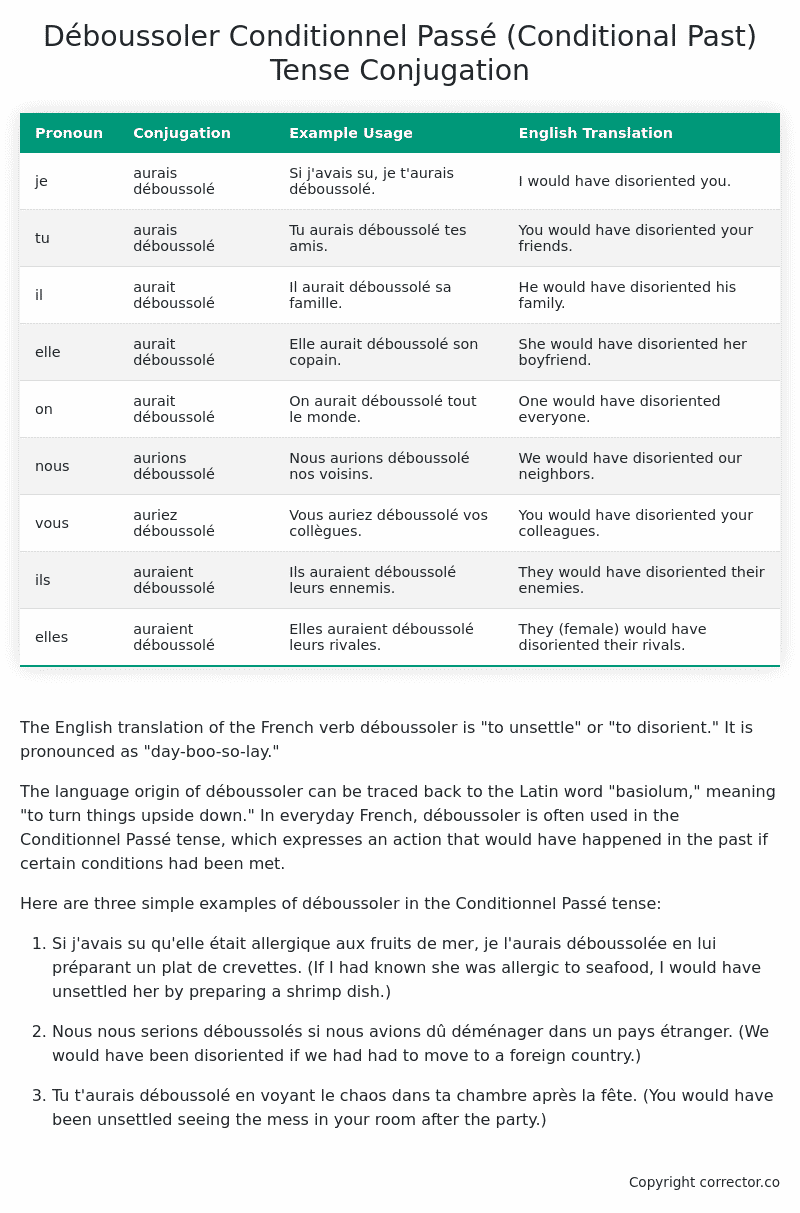Conditionnel Passé (Conditional Past) Tense Conjugation of the French Verb déboussoler
Introduction to the verb déboussoler
The English translation of the French verb déboussoler is “to unsettle” or “to disorient.” It is pronounced as “day-boo-so-lay.”
The language origin of déboussoler can be traced back to the Latin word “basiolum,” meaning “to turn things upside down.” In everyday French, déboussoler is often used in the Conditionnel Passé tense, which expresses an action that would have happened in the past if certain conditions had been met.
Here are three simple examples of déboussoler in the Conditionnel Passé tense:
-
Si j’avais su qu’elle était allergique aux fruits de mer, je l’aurais déboussolée en lui préparant un plat de crevettes. (If I had known she was allergic to seafood, I would have unsettled her by preparing a shrimp dish.)
-
Nous nous serions déboussolés si nous avions dû déménager dans un pays étranger. (We would have been disoriented if we had had to move to a foreign country.)
-
Tu t’aurais déboussolé en voyant le chaos dans ta chambre après la fête. (You would have been unsettled seeing the mess in your room after the party.)
Table of the Conditionnel Passé (Conditional Past) Tense Conjugation of déboussoler
| Pronoun | Conjugation | Example Usage | English Translation |
|---|---|---|---|
| je | aurais déboussolé | Si j’avais su, je t’aurais déboussolé. | I would have disoriented you. |
| tu | aurais déboussolé | Tu aurais déboussolé tes amis. | You would have disoriented your friends. |
| il | aurait déboussolé | Il aurait déboussolé sa famille. | He would have disoriented his family. |
| elle | aurait déboussolé | Elle aurait déboussolé son copain. | She would have disoriented her boyfriend. |
| on | aurait déboussolé | On aurait déboussolé tout le monde. | One would have disoriented everyone. |
| nous | aurions déboussolé | Nous aurions déboussolé nos voisins. | We would have disoriented our neighbors. |
| vous | auriez déboussolé | Vous auriez déboussolé vos collègues. | You would have disoriented your colleagues. |
| ils | auraient déboussolé | Ils auraient déboussolé leurs ennemis. | They would have disoriented their enemies. |
| elles | auraient déboussolé | Elles auraient déboussolé leurs rivales. | They (female) would have disoriented their rivals. |
Other Conjugations for Déboussoler.
Le Present (Present Tense) Conjugation of the French Verb déboussoler
Imparfait (Imperfect) Tense Conjugation of the French Verb déboussoler
Passé Simple (Simple Past) Tense Conjugation of the French Verb déboussoler
Passé Composé (Present Perfect) Tense Conjugation of the French Verb déboussoler
Futur Simple (Simple Future) Tense Conjugation of the French Verb déboussoler
Futur Proche (Near Future) Tense Conjugation of the French Verb déboussoler
Plus-que-parfait (Pluperfect) Tense Conjugation of the French Verb déboussoler
Passé Antérieur (Past Anterior) Tense Conjugation of the French Verb déboussoler
Futur Antérieur (Future Anterior) Tense Conjugation of the French Verb déboussoler
Subjonctif Présent (Subjunctive Present) Tense Conjugation of the French Verb déboussoler
Subjonctif Passé (Subjunctive Past) Tense Conjugation of the French Verb déboussoler
Subjonctif Imparfait (Subjunctive Imperfect) Tense Conjugation of the French Verb déboussoler
Conditionnel Présent (Conditional Present) Tense Conjugation of the French Verb déboussoler
Conditionnel Passé (Conditional Past) Tense Conjugation of the French Verb déboussoler (this article)
L’impératif Présent (Imperative Present) Tense Conjugation of the French Verb déboussoler
L’infinitif Présent (Infinitive Present) Tense Conjugation of the French Verb déboussoler
Struggling with French verbs or the language in general? Why not use our free French Grammar Checker – no registration required!
Get a FREE Download Study Sheet of this Conjugation 🔥
Simply right click the image below, click “save image” and get your free reference for the déboussoler Conditionnel Passé tense conjugation!

Déboussoler – About the French Conditionnel Passé (Conditional Past) Tense
Formation
Common Everyday Usage Patterns
Expressing Unreal Past Scenarios
Polite Requests or Suggestions
Expressing Doubt or Uncertainty
Interactions with Other Tenses
Conditional Present
Indicative Past Tenses
Conditional Future
Summary
Want More?
I hope you enjoyed this article on the verb déboussoler. Still in a learning mood? Check out another TOTALLY random French verb conjugation!


